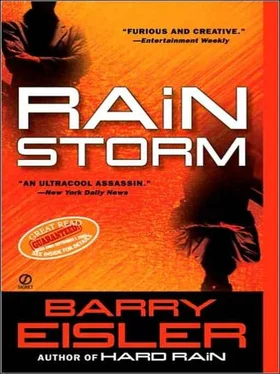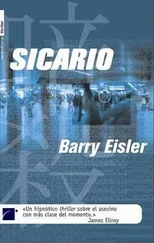I heard voices again from the bedroom, but could only make out a bit of what they were saying. It seemed that Belghazi was adamant about not seeing a doctor. Christ, I was going to have to spend the night slung up under the sink like a rock climber sleeping alongside a mountain.
I heard Delilah’s voice. Something about “ médecine .” The door to the suite opened and closed.
Two minutes passed. Silence from the suite. Then the sounds of footsteps, rapidly approaching. Someone burst into the bathroom and blew past me into the toilet stall. The stall door slammed, followed immediately by the sounds of Belghazi retching.
I heard Delilah’s lighter footsteps. She headed straight for the sink and squatted down so she could see me. She must have given it some thought and realized that this would be the only decent place to hide. Again I was impressed.
“I’ve sent the guard to get some medicine,” she whispered. “This will be your only chance.”
Without a word I rolled out of the harness and dropped silently to the floor on one hand and the balls of my feet. I started to reach up to undo the equipment, but Delilah stopped me with a hand on my shoulder. “Leave the rig,” she said. “There’s no time. I’ll take care of it later.”
From behind the stall door, Belghazi exclaimed, “ Merde !” and retched again. I nodded at Delilah and headed for the exit. She followed me closely. I paused before the door and used the SoldierVision to confirm that the hallway was clear before leaving.
I moved into the empty corridor. She shut the door behind me without another word.
I’D BEEN LIVING in Brazil for almost a year when they finally got to me. It had rained that day, the sky full of oppressive, low-lying clouds that clung to Rio’s dramatic cliffs like smoke from some faraway calamity.
After leaving Tatsu in Tokyo, I had finished preparing Yamada-san, the ice-cold alter ego I had created as an escape hatch for the day my enemies might succeed in tracking me to Japan, as indeed they had, for his departure to São Paulo. São Paulo is home to some six hundred thousand of Brazil’s approximately one million ethnic Japanese, the largest such community outside Japan, and the kind of place in which a recent arrival like Yamada-san might easily lose himself.
Yamada found a suitable apartment in Aclimação, a residential neighborhood near Liberdade, São Paulo’s Japanese district, from which he made the necessary arrangements to establish his new business of shipping high-quality, low-cost Brazilian judo and jujitsu uniforms to Japan-a business which, if conditions were favorable, he might one day expand to include additional exportable items. Many of his neighbors were of Korean and Chinese extraction, which suited Yamada because such Asian faces made it easier for him to blend. A more heavily Japanese setting, such as that of Liberdade itself, would have conferred the same advantages, but could have been problematic, as well, because Japanese neighbors would have been more inclined to probe the specifics of his background, and to discuss it among themselves afterward. To the extent that he did need to share some of his past with his Japanese neighbors, Yamada would explain that he was from Tokyo, a simple sarariiman , or salary man, who had suffered the double indignity of being laid off by one of Japan’s electronics giants and then being abandoned by his wife of twenty years, for whom he could no longer provide as she expected. It was a sad, although not uncommon story in those difficult economic times, and Yamada’s neighbors, with typical Japanese restraint, would nod sympathetically at the telling of his lament and press for no further details.
Yamada obsessed over the study of Portuguese-tapes, tutors, television, music, films, even a series of professional women, because, Yamada knew, there is no more natural or productive route to the acquisition of a language than the sharing of a pillow. Every few weeks, he would leave town to travel, to acquaint himself firsthand with his adopted land: the vast cerrado , the central plains, with its handful of frontier towns and vanishing Indian tribes, and its bizarre, planned city, Brasília, stuck on the land as though by extraterrestrials in imitation of an earthen metropolis; the prehistoric enormity of Amazonas, where the scale of everything-the trees, the water lilies, and, of course, the river itself-first diminishes and then extinguishes the traveler’s sense of his own human significance; the baroque art and architecture of Minas Gerais, left behind like a conflicted apology by the miners who centuries earlier had raped the region’s land for its diamonds and gold.
Yamada avoided Bahia and in particular its capital, Salvador. Rain knew a woman there, a beautiful half-Brazilian, half-Japanese named Naomi, with whom Rain had enjoyed an affair in Tokyo and to whom he had made a promise when she was forced to flee to Brazil. Yamada wanted to go to her there, but at the same time hesitated to do so, finding himself unsure, at some level, of whether he was attempting to forestall the inevitable or simply hoping to relish the anticipation of its arrival. Occasionally Yamada was troubled by such thoughts, but his new surroundings, exotic after so many years in familiar Japan, his travels, and his constant study of the language, were all strongly diverting.
Yamada’s linguistic progress was excellent, as one might expect of a man who already spoke both English and Japanese as a native, and after six months he judged himself ready to relocate to Rio; more specifically, to Barra da Tijuca, known throughout Rio simply as Barra, a middle- and upper-middle-class enclave extending for some nineteen kilometers along Rio’s southern coast. He chose a suitable apartment at the corner of the Avenida Belisário Leite de Andrade Neto and the Avenida General Guedes da Fontoura. It was a good building, with entrances on each of the streets it faced, and nothing but other residences all around, therefore offering, had Yamada been inclined to reflect on such matters, multiple points of egress and no convenient areas from which some third party might set up surveillance or an ambush.
In Barra the Yamada identity finally began to feel truly comfortable. Partly it was that I’d lived as Yamada for so long at that point; partly it was that the São Paulo stopover had been only one step removed from Japan, and therefore from those enemies who were trying to find me there; partly it was the inherent difficulty of feeling uncomfortable for long in Rio, its rhythms, indeed its life, defined as they are by the culture of its beaches.
In my new environs I became a Japanese nisei , one of the tens of thousands of Brazil’s second-generation ethnic Japanese, who had decided to retire to Rio from São Paulo. My Portuguese was good enough to support the story; the accent was off, of course, but this was explainable by virtue of having grown up in a Japanese household and having spent much of my childhood in Japan.
I was intrigued at how distant a notion Japan seemed to present to my nisei cousins. It seemed that, when they looked in the mirror, they saw only a Brazilian. If they thought about it at all, I imagined, Japan must have felt like a coincidence, a faraway culture and place not much more important than the other such places one reads about in books or sees on television, something that meant a great deal to their parents or grandparents but that wasn’t particularly relevant to them. I found myself somewhat envious of the notion of forgetting where you had come from and caring only about who you are, and liked Brazil for offering a culture that would foster such a possibility.
And Barra offered this culture triple-distilled. My nisei story was thin, I knew, but it didn’t really matter. Barra, the fastest growing part of the city, its skyline increasingly crowded with new high-rises, its neighborhoods ceaselessly changing with departures and arrivals, is much more focused on the future than it is with anyone’s particular past. It’s the kind of place where, a month after you’ve been there, you’re considered an old-timer, and I had no trouble fitting in.
Читать дальше












